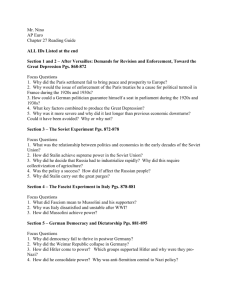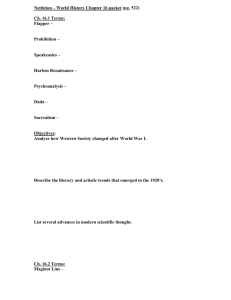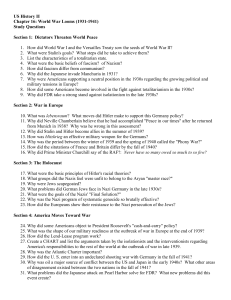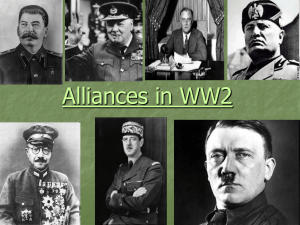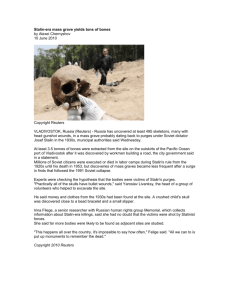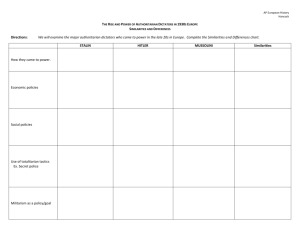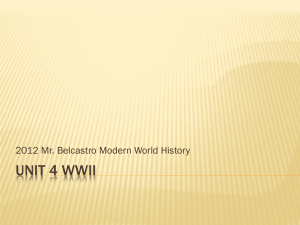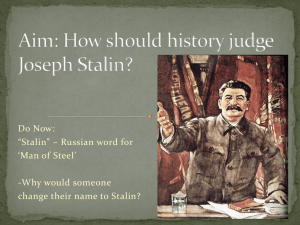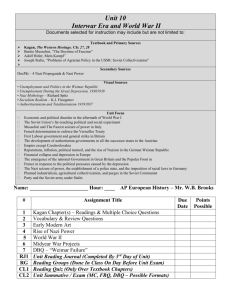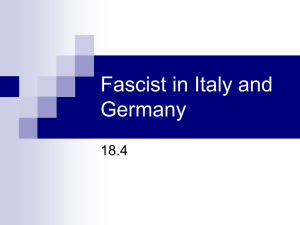AP European History: Interwar Years & Fascism Study Guide
advertisement
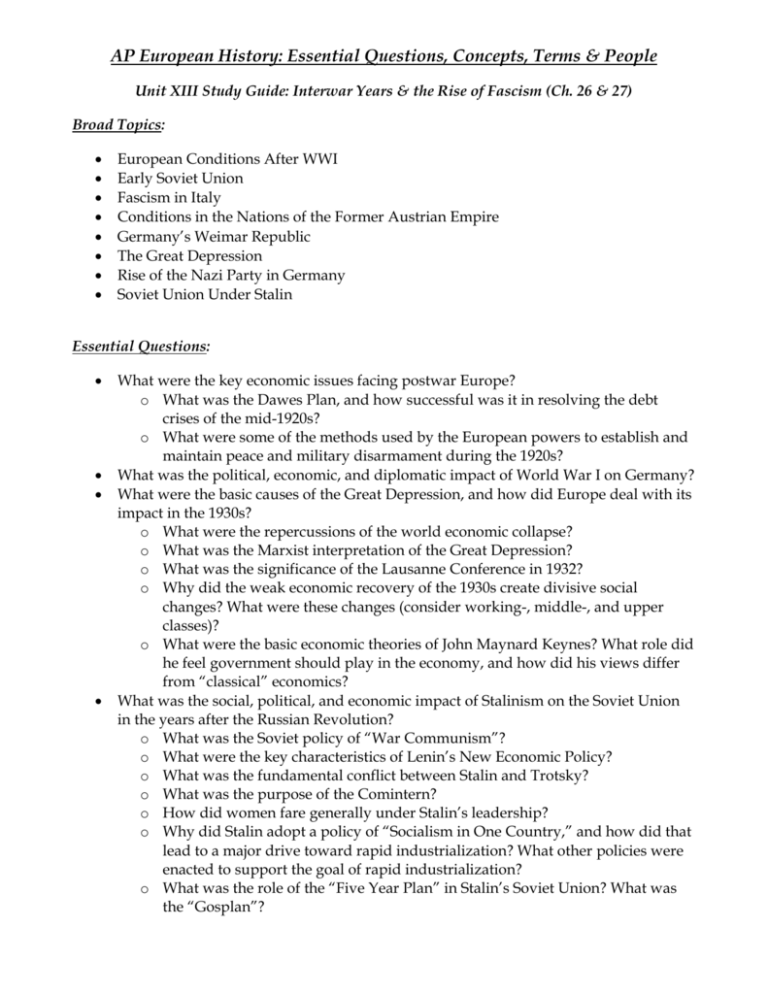
AP European History: Essential Questions, Concepts, Terms & People Unit XIII Study Guide: Interwar Years & the Rise of Fascism (Ch. 26 & 27) Broad Topics: European Conditions After WWI Early Soviet Union Fascism in Italy Conditions in the Nations of the Former Austrian Empire Germany’s Weimar Republic The Great Depression Rise of the Nazi Party in Germany Soviet Union Under Stalin Essential Questions: What were the key economic issues facing postwar Europe? o What was the Dawes Plan, and how successful was it in resolving the debt crises of the mid-1920s? o What were some of the methods used by the European powers to establish and maintain peace and military disarmament during the 1920s? What was the political, economic, and diplomatic impact of World War I on Germany? What were the basic causes of the Great Depression, and how did Europe deal with its impact in the 1930s? o What were the repercussions of the world economic collapse? o What was the Marxist interpretation of the Great Depression? o What was the significance of the Lausanne Conference in 1932? o Why did the weak economic recovery of the 1930s create divisive social changes? What were these changes (consider working-, middle-, and upper classes)? o What were the basic economic theories of John Maynard Keynes? What role did he feel government should play in the economy, and how did his views differ from “classical” economics? What was the social, political, and economic impact of Stalinism on the Soviet Union in the years after the Russian Revolution? o What was the Soviet policy of “War Communism”? o What were the key characteristics of Lenin’s New Economic Policy? o What was the fundamental conflict between Stalin and Trotsky? o What was the purpose of the Comintern? o How did women fare generally under Stalin’s leadership? o Why did Stalin adopt a policy of “Socialism in One Country,” and how did that lead to a major drive toward rapid industrialization? What other policies were enacted to support the goal of rapid industrialization? o What was the role of the “Five Year Plan” in Stalin’s Soviet Union? What was the “Gosplan”? o Why did Stalin initiate the policy of collectivized agriculture? How did the people of the Soviet Union respond, and how did collectivization affect the people? What effect did collectivization have on the urban population of the Soviet Union? o Why did Stalin initiate the Great Purges in the 1930s, and how was the assassination of Sergei Kirov used as a pretext for them? What were the core beliefs and practices of fascism as demonstrated by Mussolini in Italy after World War I? o What was the goal of the “corporate state,” and how did it set the relationship between government, business, and labor in fascist Italy? o What were the major components of fascist economic policy? o What were some of Mussolini’s “notable” achievements? o Why did Mussolini’s government feel it necessary to make an accommodation with the Vatican, and what did each side receive from their signing of the Lateran Treaty in 1929? What was the main governmental focus in France and Great Britain during the 1920s? o Why was Ramsay MacDonald considered a “traitor” to his Labour Party principles? o How was the French election of 1936 a drastic change from earlier elections in the decade? o What reforms were initiated by Blum’s Popular Front government in France? Why did it fail within a year? How did most of Ireland gain its independence from Britain? What were some of the major ethnic, social, and religious conflicts that dominated the newly independent nations of Eastern Europe and the Balkans? Which Eastern European country became a model of democracy in the 1920s and 1930s, and why? o What was the political pattern followed by many governments in Eastern Europe in the 1930s? How supportive were they of fascism? What were the c How did Adolf Hitler rise to power in Germany, and how did his policies compare with those of other totalitarian dictators of the 1920s and 1930s? o Why did the German government resort to military force in early 1919, badly damaging its new democracy? o Why were the political “extremes” growing in power at the expense of the political “center” in the 1920s? o What efforts did Gustav Stresemann make to stabilize the economic situation in the Weimar Republic? How successful was he? What was the significance of the Locarno Agreements of 1925? o Why did the Weimar republic collapse in the early 1930s? o What were some of the economic successes of the early Nazi years, & how was Hitler able to accomplish them? o What did Hitler see as the role of women in the Nazi state? o What were Hitler’s basic racist and political views, and how were these views a reflection of some 19th and early 20th century political and scientific thinkers? o Why were Jews primary targets of Nazi hatred? How was Nazi ideology reflected in the Nuremberg laws? o How did the Nazis use propaganda to make Germans feel they were all part of a great cultural struggle? Concepts, Terms, & People: Benito Mussolini Adolf Hitler Heinrich Himmler Vladimir Lenin Leon Trotsky Josef Stalin Sergei Kirov Gustav Stresemann Friedrich Ebert Paul von Hindenburg Leni Riefenstahl Ramsay MacDonald Leon Blum John Maynard Keynes Stanley Baldwin Salvador Dalí Wassily Kandinsky Franz Kafka General Strike of 1926 Irish Republican Army Sinn Fein (“Ourselves Alone”) Young Plan French Popular Front Weimar Republic Ruhr Crisis Reparations Great Depression Dawes Plan War Communism New Economic Policy (NEP) Comintern Third International “Socialism in One Country” Five Year Plans Gosplan Collectivization Kulaks Gulags Great Purges NKVD Collectivization Totalitarianism Fascism Black Shirts Il Duce “Believe, Obey, Fight!” Corporate State/Corporatism Lateran Accord Locarno Agreements Nazism National Socialism “Stab-in-the-Back” Theory Reichstag Fire of 1933 Enabling Acts Third Reich Der Führer Mein Kampf Lebensraum Kraft duerch Freude (“Strength Through Joy”) Gleichschaltung Hitler Youth Nuremburg Laws The Triumph of the Will Beer Hall Putsch Swastika Stormtroopers (SA) Schutzstaffel (SS) Gestapo Kristallnacht Night of the Long Knives Final Solution Kellogg-Briand Pact Popular Front Dadaism Bauhaus Expressionism Surrealism
